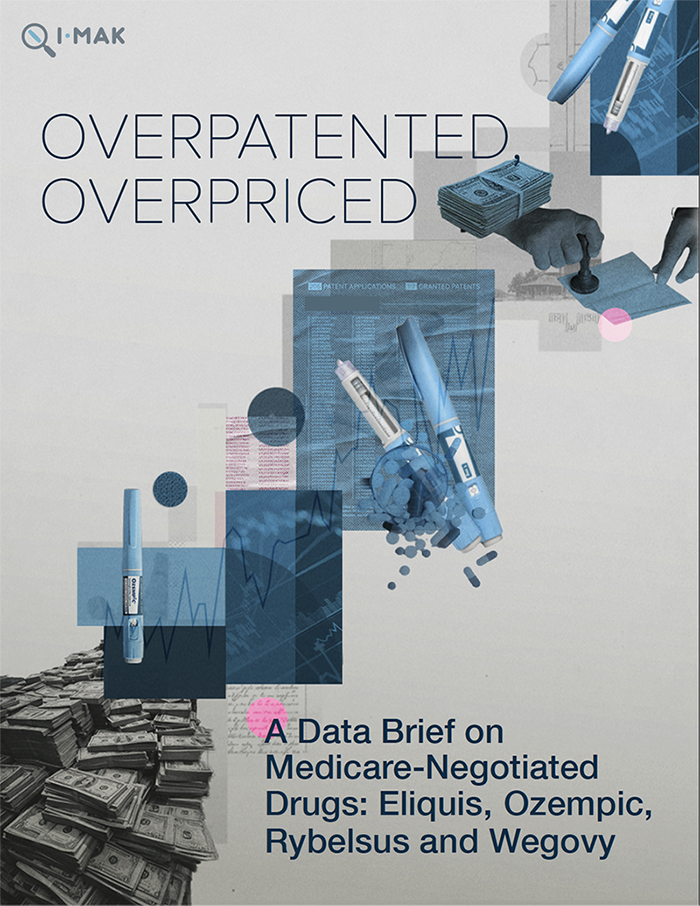Data brief analyzes patenting and pricing practices for blockbuster drugs Eliquis and semaglutide medications (Ozempic, Rybelsus, Wegovy), continuing the acclaimed Overpatented, Overpriced series that exposes flaws in the U.S. patent system
NEW YORK CITY, NY / ACCESS Newswire / June 16, 2025 / The Initiative for Medicines, Access, and Knowledge (I-MAK) published the latest data brief in its landmark Overpatented, Overpriced series, revealing the multiple ways pharmaceutical companies are able to extend their patent protection and keep drug prices high. The new data brief exposes how these systemic flaws impact Eliquis, a top-selling blood thinner, and the semaglutide family of diabetes and weight-loss drugs including Ozempic, Rybelsus, and Wegovy.

A Data Brief on Medicare-Negotiated Drugs: Eliquis, Ozempic, Rybelsus and Wegovy
The data brief accompanies updates to I-MAK's Drug Patent Book, a comprehensive and publicly accessible database that reveals detailed patent information on a number of bestselling pharmaceutical drugs, and builds on I-MAK's acclaimed Overpatented, Overpriced investigation series, which has become a cornerstone resource for policymakers, researchers, and advocates working to address America's prescription drug pricing crisis.
Key findings include:
Patent Term Extensions Drive Billions in Extra Revenue: Statutory Patent Term Adjustment (PTA) and Patent Term Extension (PTE) mechanisms delay generic medicine entry and generate billions in additional revenue for blockbuster drugs, even before accounting for extended market monopolies from follow-on patenting.
"Patent Thickets" Block Competition: Beyond initial statutory patent extensions, pharmaceutical companies file numerous follow-on patents covering minor modifications of original inventions in order to block competition and research pathways.
U.S. Patients Pay Up to Eight Times More: Americans pay more for identical medications, partly from other countries engaging in robust, mandated pharmaceutical price negotiations covering all patients, not just selected government programs.
Years-Long Delays for Generic Competition: Patients in Europe, Canada, Japan, and similar markets benefit from earlier generic entry compared to U.S. patients, who wait years longer for low-cost alternatives.
Billions in Excess Spending: Extended market monopolies extract billions in excess spending from patients, insurers, and taxpayers-profit far beyond what the original social contract of the patent system intended to provide.
"What we're seeing is a patent system that is designed to help drugmakers extend their patent monopolies so they can maximize profits at the expense of affordable medicines patients can access," said Tahir Amin, CEO and co-founder of I-MAK. "We need to change these different incentives in the patent system as they are being exploited to the detriment of the public."
The findings underscore the urgent need for patent system reform and stronger Congressional and regulatory oversight. I-MAK's research and evidence has informed legislative efforts to address prescription drug pricing and has been cited by policymakers across the political spectrum.
"This research provides policymakers with the hard data they need to understand how patent abuse is the root cause of high drug prices in the United States," states Amin. "We can't fix what we can't see, and I-MAK's work is essential for bringing transparency and accountability to a system that has operated in the shadows for far too long."
Contact Information
Simon Tam
Director of Communications
simon@i-mak.org
(443) 267-4666
SOURCE: Initiative for Medicines, Access & Knowledge
View the original press release on ACCESS Newswire:
https://www.accessnewswire.com/newsroom/en/healthcare-and-pharmaceutical/i-mak-report-reveals-how-extending-patent-terms-inflates-prices-of-me-1039435
